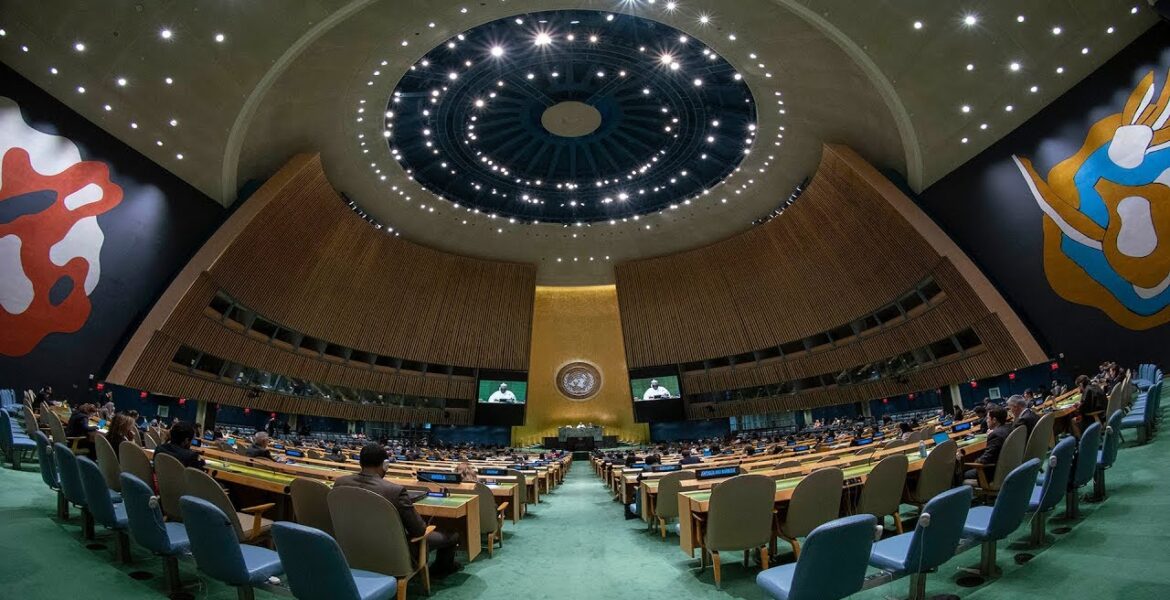The United Nations (UN) General Assembly has unanimously adopted a resolution proposed by Greece titled “Return or restitution of cultural property to the countries of origin”, a significant result which could assist Greek efforts in convincing the British government to return the Parthenon sculptures held in the Duveen gallery of the British Museum.
The move prompted the Greek Foreign Ministry to celebrate the win on its twitter account: " Greece’s three-year resolution was supported by an unprecedented 111 countries"
6 DECEMBER 2021 - Prior to Vote:
During proceedings, the assembly turned to the Secretary-General’s report titled “Return or restitution of cultural property to the countries of origin” (document A/76/321), adopting an eponymous draft resolution (document A/76/L.17) without a vote.
Introducing the draft, the representative of Greece stressed its importance at a time when unprecedented attacks are being carried out against cultural property in the Middle East and elsewhere. Adding that looting of antiquities is now financing terrorism, he expressed concern over the theft of cultural property in areas of armed conflict.
By the draft’s text, the Assembly called on relevant United Nations and other intergovernmental organizations to coordinate with the United Nations Educational, Scientific and Cultural Organization (UNESCO) to address return or restitution of cultural property to the countries of origin and to provide appropriate support.
Further to the text, the Assembly deplored damage to the cultural heritage of countries in situations of crisis, conflict and post-conflict, particularly recent attacks on world cultural heritage sites, calling for an immediate end to such acts. It urged Member States to ensure all actors trading in cultural property, including auction houses, art dealers, art collectors, museum professionals and managers of online marketplaces, provide verifiable provenance documentation as well as export certificates related to any cultural property imported, exported or offered for sale, including through the Internet.
Speaking before the draft’s adoption, the representative of Egypt stressed the importance of recovering all stolen cultural property, adding that the international community should support efforts of African countries to restore looted items of national heritage.
The representative of Iran highlighted the leading role of UNESCO in combating illicit trafficking in cultural property. He welcomed phrases in the text emphasizing the need to fight against financing of terrorism through illicit trafficking in cultural property, and the obligation of States to return such property to countries of origin. He pointed to illegal excavations and threats to cultural heritage in Palestine, in particular the Aqsa mosque compound, by the Israeli occupation regime, along with its attempts to destroy and change the mosque’s function.
The representative of Cambodia said his country has lost cultural properties, including to private collections, over decades of civil war. He encouraged museums and private collectors with Khmer cultural properties to repatriate them, stressing that Cambodia will continue to gather extensive evidence to document looting of its treasures. Expressing appreciation for the United States Government’s efforts to secure the return of his country’s cultural properties from the Denver Art Museum, he said the partnership has opened an opportunity for the return of “souls” of their Khmer ancestors.
The representative of Cyprus, emphasizing that pillaging and illicit trafficking of cultural property is reaching vast proportions, said such crime is directed against history and cultural identity. Adding that trafficking in cultural property is now a global industry, he said the international community must redouble efforts to combat it. The current draft represents a positive step in that direction in attempting to bridge gaps in legislation at national and international levels.
The representative of Syria underscored the importance and relevance of the draft in addressing the threat to cultural heritage, noting that antiquities in the Middle East are systematically looted. Syria has endured a savage terrorist campaign over the past several years, he said, which has targeted public and private properties as well as historic areas listed by UNESCO. Destruction of cultural property has also included the work of Syrian scholars as well as graves of historic people, scientists and clergymen. Artifact smuggling has been facilitated by the Turkish regime, he added, which has made Syria’s border a corridor for trafficking into that country and further afield.
The representative of the United States said trafficking in cultural property denies populations, especially indigenous peoples, objects that form a central part of their heritage.


